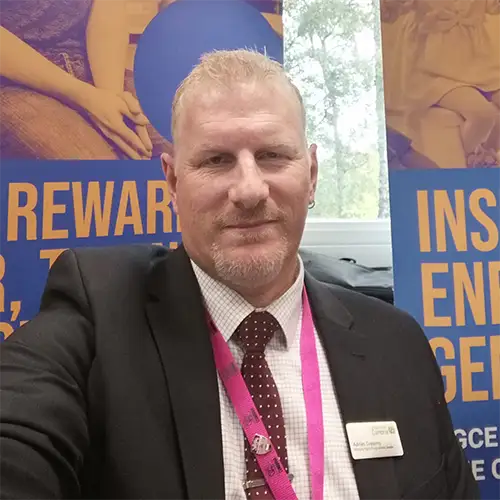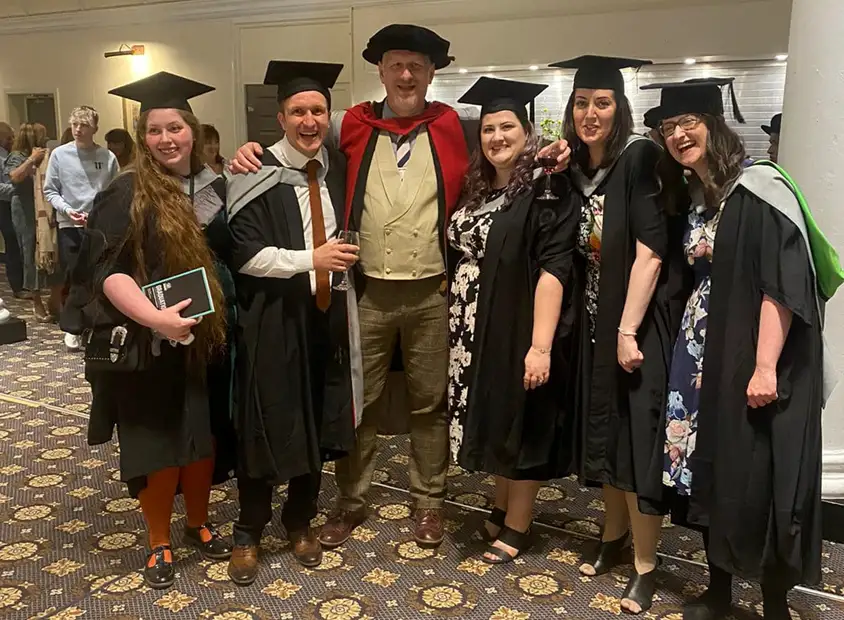

Tell us a little about yourself
I have now been at University of Cumbria and before that, St Martin’s College, one of its legacy institutions since 2003. I work in Initial Teacher Education, heading up the university’s primary postgraduate programmes across all campuses including school direct.
My specialist area is English, so I teach a lot of that as well as general teaching skills like behaviour management, lesson planning and assessment. I also teach on the masters’ level modules for the PGCE and supervise PhDs.
Prior to this I was a primary school teacher and senior leader in a small school in west Lancashire and then a much larger Lancaster city centre school. Whilst there I was a mentor for students and newly qualified teachers and I was invited by our school’s partnership tutor to apply for a role at S. Martin’s College, where I had qualified from with my degree and Qualified Teacher Status seven years earlier.
What’s your industry background
So, as I mentioned before I worked in two contrasting primary schools prior to coming into higher education. I taught mainly ages 7-11 (Years 3-6). This gave a me a lot of experience of teaching, developing my skills, maturing as a person and teacher and I had a fantastic time, taught some great young people (some who I still see and some who have since done their teacher training with me!!!).
I have also worked with some great colleagues and had some fantastic experiences in the classroom, on school trips, residentials, leading sports clubs, choirs and a samba band. Transitioning into academia was quite a challenge. Moving from filling a one-hour lesson with 9-year-olds to two-hour seminars with 24-year-olds was a huge challenge. Thankfully I had lots of support from a brilliant team, a hugely supportive line manager and some gracious students.
I also found completing the Postgraduate Certificate in Teaching and Learning in Higher Education really helpful in understanding some of the key differences in teaching approaches with students.
Can you tell us about your research?
As someone who didn’t do brilliantly at school, I have never really considered myself academic, so achieving a PhD in 2021 was probably a huge highlight and achievement for me. I have also published a couple of books – available on Amazon, or in the library – ‘Being Creative in Primary English’ published in 2016 and ‘Thinking for primary Writing’ (based on my PhD research) published earlier in 2024.
What might surprise people to learn about you?
I used to be a Pig Farmer!!
What modules do you teach?
I teach a wide variety of modules, so it is very hard to choose which ones to highlight here.
One of my favourites to teach is for our primary PGCE students which focuses them on elements of high-quality learning and teaching, such as outdoor learning, creative thinking, mindset theory. The students then prepare an intervention in school on one of these elements and evaluate its success.
I really enjoy the work the students do on this module, they really grapple with some of the grey areas of their chosen aspect and learn loads. There is also an opportunity for me to get into ‘creative thinking mode’ and have some fun with the teaching and learning.

What’s your favourite thing about teaching at Cumbria?
The team that I lead and work with are fantastic. We have a great bunch of tutors who care about students, care about learning and are huge advocates for teachers and teaching. I really enjoy the small campuses – you know everyone, great relationships are developed in these environments and I think that is a huge strength of University of Cumbria.
I also love the students we attract – a real mix of characters and experience which adds to the richness of the learning.
We also have a gorgeous landscape around us!
What makes your course different?
The primary PGCE offers a unique and innovative pathway called ‘Environmental and Experiential Learning’ which looks at place-based learning, unique to Morecambe through Eden Project North. It provides students with an exciting opportunity to get involved in curriculum shaping, explore key up to date concepts such as sustainability and climate change and make a difference to the learning experiences of many learners in the region.
We also structure our programme intentionally around three school placements whereas most providers offer two. This means you get a wider variety of school experience and a range of year groups which is helpful when applying for jobs. Three placements also means more opportunity to come back to university in between to evaluate learning, share experiences and learn from the tutors and other students before going back out into school.
What advice would you give to students considering studying on this course?
One of the key pieces of advice I would give to those wanting to go into teaching, is get some experience of being in a school and working with children in this setting if you can. Schools are interesting places and haver their own sets of dynamics which are important to navigate.
Those students who understand that and can bring good interpersonal skills to the programme do tend to do very well on the course.
You also have to make sure you are fascinated by how children learn and actually enjoy being with children. It makes a real difference to the job and to the lives and experiences of those you will teach.
I would also say, don’t always listen to the negative ways in which social media and popular press often paint teachers and teaching. I have the privilege to work with many wonderful schools, some brilliant and innovative teachers and some superb children. There is some great work going on in our primary schools that you can be a part of.
There are other avenues that the PGCE with Qualified Teacher Status can open up for you. You may wish to pursue something like museums education, play therapy, educational psychology and many other opportunities to put your transferable skills to very good use.
